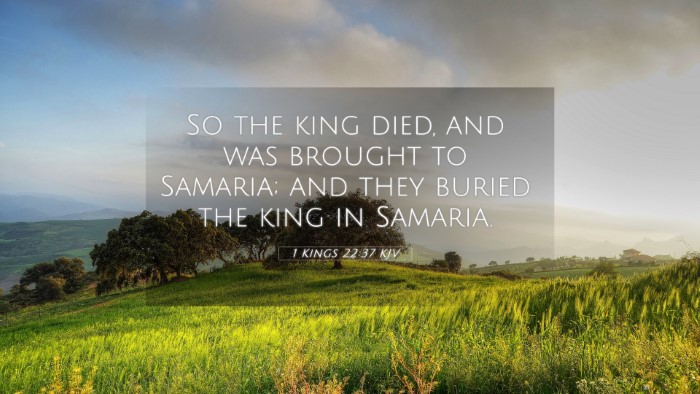Meaning and Interpretation of 1 Kings 22:37
In 1 Kings 22:37, the text states, “So the king died, and was brought to Samaria; and they buried the king in Samaria.” This verse marks a significant moment in the narrative of the kings of Israel, notably in the context of King Ahab's downfall. Various public domain commentaries shed light on its implications, reflecting the theological and historical significance of this passage.
Historical Context
The context of Ahab's death is critical to understanding this verse. As referenced in Matthew Henry's Commentary, Ahab was known for his conflicts and the pursuit of idolatry, which led to much turmoil within Israel. His death signifies a pivotal moment within the broader narrative of Israel's kings.
Albert Barnes highlights that Ahab's demise was not abrupt but followed a series of prophetic warnings. His disregard for God's message through prophets ultimately resulted in his tragic end, fulfilling the prophecies concerning his reign. Ahab’s pursuit of both personal gain and sinful alliances set the stage for divine judgment.
Theological Themes
- Faithfulness to God: Ahab's life serves as a cautionary tale against the neglect of divine guidance. Clarke notes that the king's idolatry was a direct violation of the covenant between God and Israel.
- Divine Judgment: The death of Ahab is a powerful reminder of God's sovereignty and the consequences of disobedience, a theme throughout scripture that emphasizes the need for repentance.
- Legacy of Leadership: The mentioning of Ahab’s burial in Samaria also serves as a commentary on how leaders are remembered, framing the moral implications of their reign.
Bible Cross-References
To further deepen the understanding of this passage, several cross-references can be examined:
- 1 Kings 21:19-22: The prophecy concerning Ahab's fate following the murder of Naboth.
- 2 Kings 9:25-26: Elisha’s prophecy about Ahab’s sons and the judgment that would fall on his house.
- 1 Kings 16:30-33: The description of Ahab's wickedness in the eyes of the Lord.
- Jeremiah 22:18-19: A reflection on the mourning of a king due to their sinful legacy.
- Proverbs 11:7: The connection between the hope of the wicked perishing and their legacy.
- 2 Kings 10:1-11: The end of Ahab’s lineage under King Jehu, fulfilling the prophecy against him.
- Revelation 19:20: The ultimate judgement for those who oppose God, relating to Ahab's eternal state.
- Isaiah 14:20: The prophetic declaration about the fate of those who have done evil.
Connections between Bible Verses
This passage draws important connections with themes explored throughout both the Old and New Testaments. For instance:
- 1 Kings 18:21: The confrontation with the prophets of Baal highlights Ahab's conflict with God's command.
- Luke 12:47-48: The New Testament echoes the responsibilities of knowing the truth and the consequences for neglecting God's call.
- 2 Chronicles 18:33-34: Reveals the moment of Ahab's death, providing a narrative parallel to 1 Kings 22.
- Matthew 7:24-27: The wisdom of building one's life on God’s word is reflected in Ahab's tragic choices.
Biblical Analysis Techniques
For those engaging in a deeper study of this verse, employing various cross-referencing methods may yield richer insights. Consider the following:
- Bible Concordance: Use a concordance to find related themes or key terms.
- Comparative Bible Analysis: Compare accounts from separate biblical texts to comprehend the overarching narrative.
- Bible Reference Resources: Utilize commentaries and theological texts to support your understanding of the verse.
- Inter-Biblical Dialogue: Reflect on how this verse connects to New Testament teachings and the overarching themes of redemption.
Conclusion
In summary, 1 Kings 22:37 serves as a crucial representation of the consequences of leadership that strays from fidelity to God. Through careful study and cross-referencing, one can uncover deep theological insights and understand the connections across the biblical narrative that speak to both the specific context of Ahab’s life and the broader implications of divine justice and mercy in scripture.


